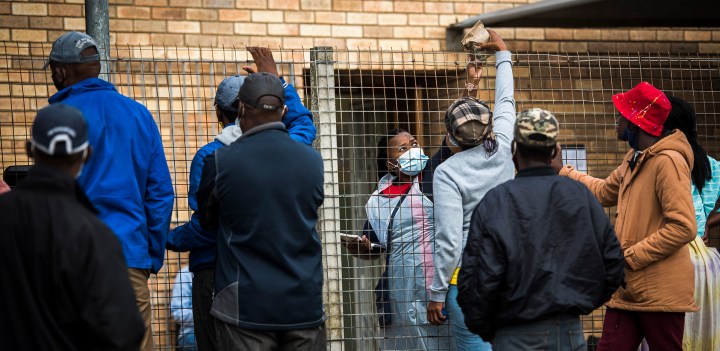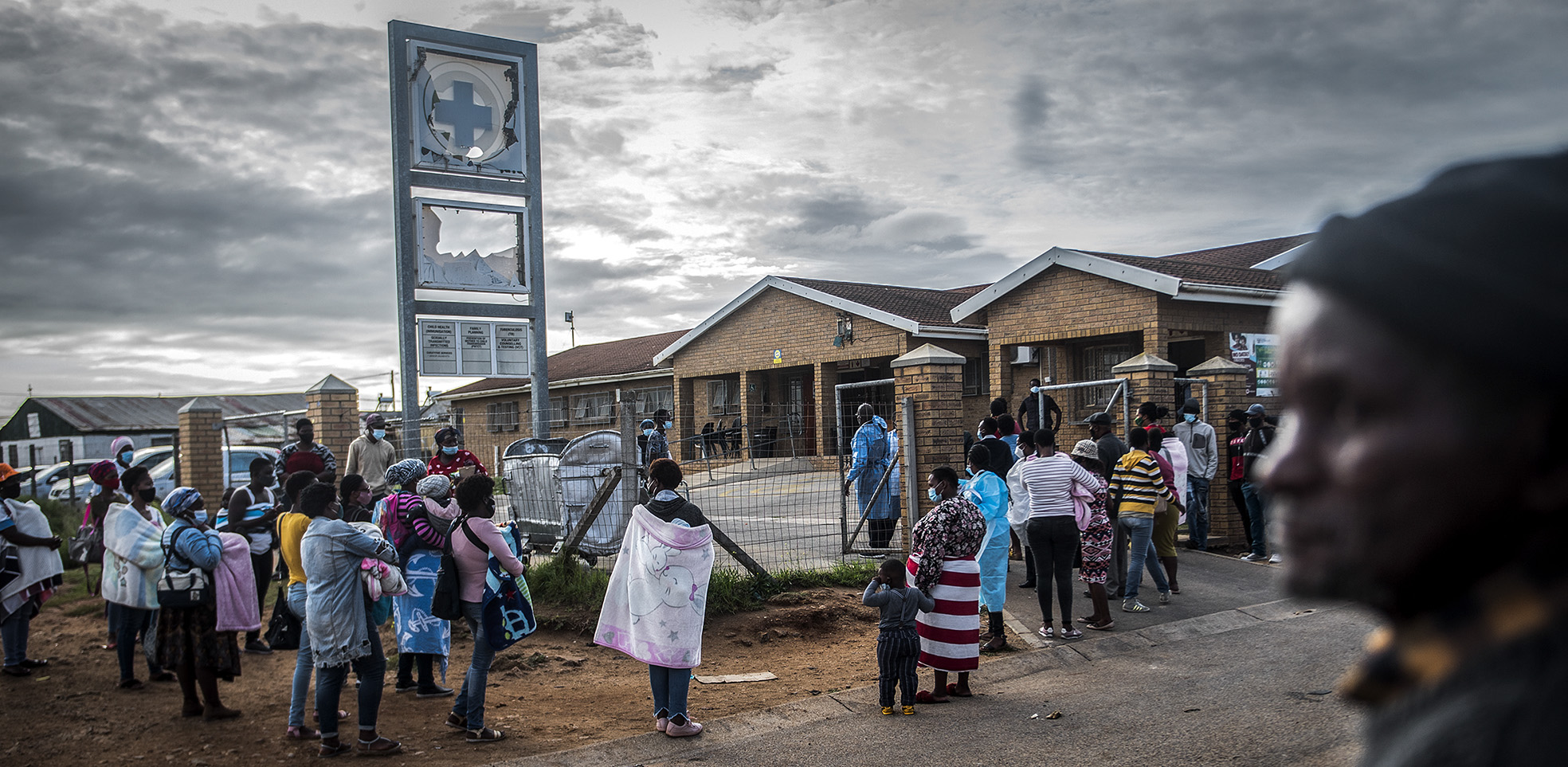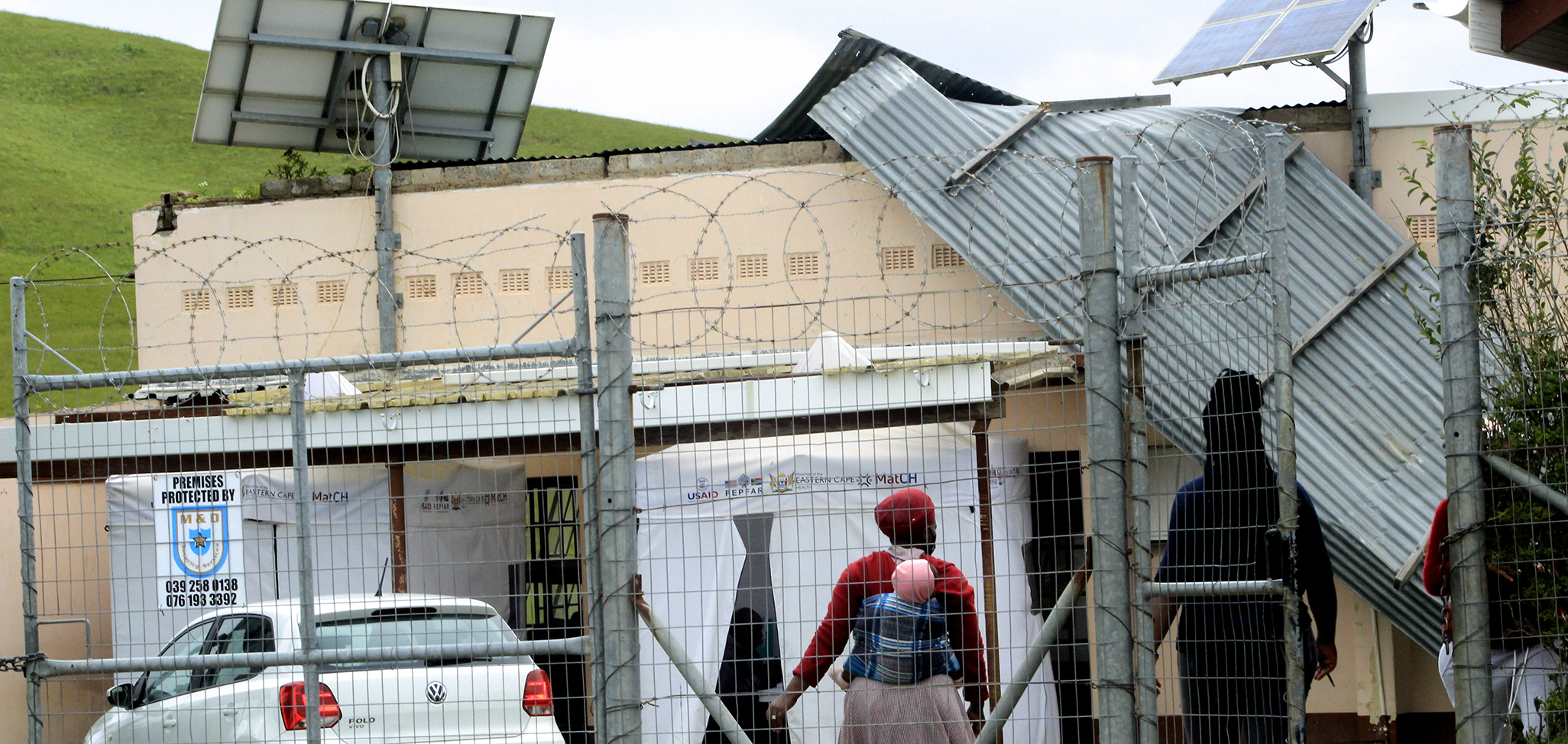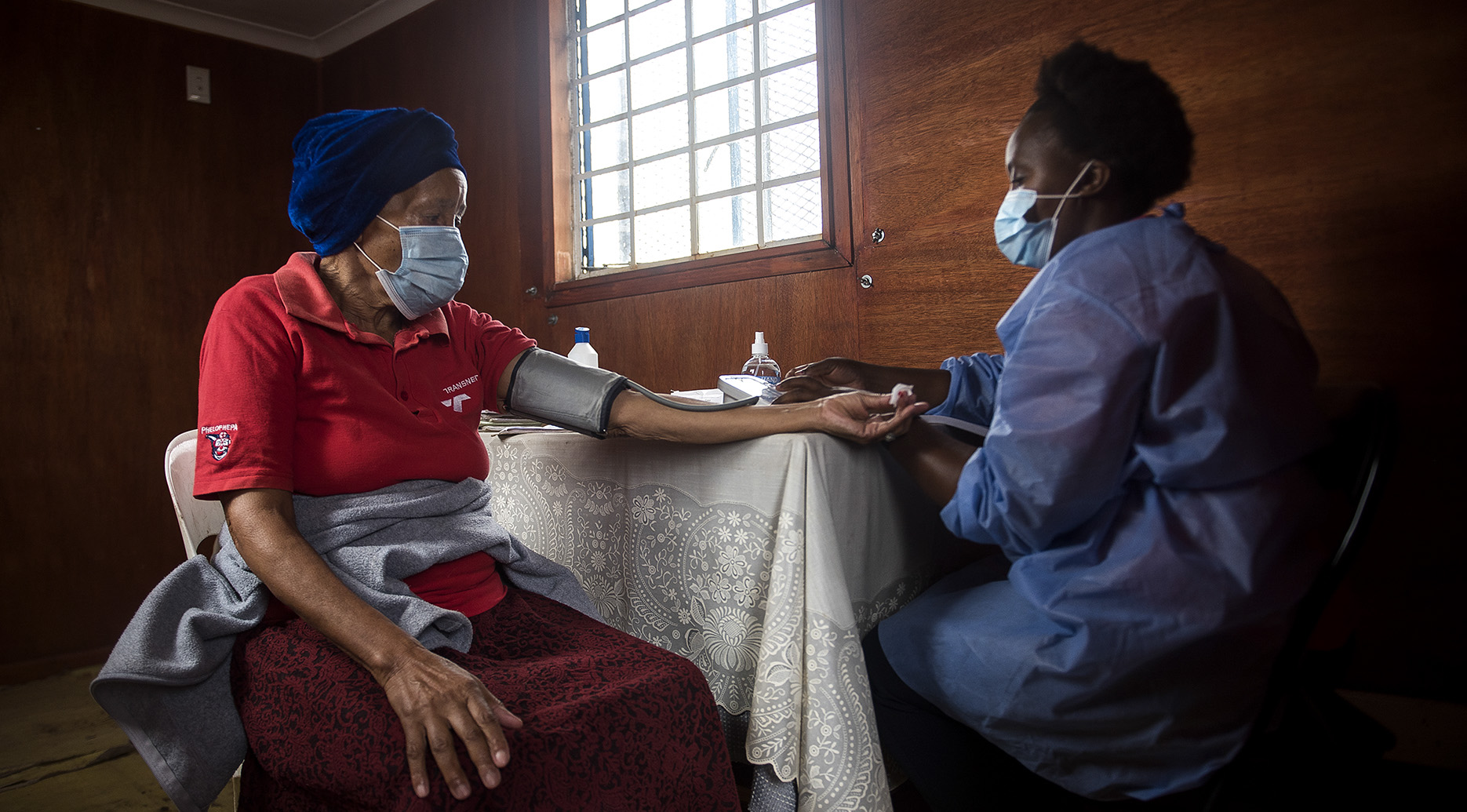A PROVINCE AT BREAKING POINT
Survival of the fittest: Battle for help at Eastern Cape clinics

In the third of our series of reports on the state of the Eastern Cape Health Department, we look at the state of clinics where patients access HIV, TB and primary healthcare. At clinics all over the Eastern Cape patients start lining up for help as early as 4am, braving dark roads, hunger and battling fatigue and anxiety that they will not be assisted.
This article was produced in partnership with Spotlight.
“It is the survival of the fittest at this clinic,” Joyce Mahambehlala (62) says as she lines up once again to collect her medicine.
The Motherwell Community Health Centre has a 24-hour emergency unit accommodating frail and chronic patients including the elderly and children, but the lines are long.
Mahambehlala from NU7 in Motherwell has been collecting her medication for chronic illness from the Motherwell community health centre for several years.
“It is the survival of the fittest at this clinic and one has to wake up as early as 4am. In the good olden days, we used to come to the clinic and then go to work, but now we can’t do that because our clinic takes a whole day to treat patients.
“Last week Friday I was turned back without being treated as the clinic had taken enough for the day. Nurses gave me an alternative date for Monday, but I could not come on Monday because it was raining. There are no sheds outside of the clinic where we are made to queue before they open the gates at 7am.”

Mothers with babies queue at Motherwell clinic. (Photo: Shiraaz Mohamed)
Phindile Keli (78), who needs treatment for an eye condition, said it was a dangerous 3km he had to walk to the clinic.
“They are supposed to open at 7am, but it’s already 7:30 am and no one is coming to inform us as to what is happening. I’m now afraid that if I spend the whole day here I will collapse from hunger since I don’t have money to buy food or fruits. I have travelled on foot from NU9 where I stay, to come here, which is a distance of more than 3km. The other challenge is that the road is dangerous with criminals who pounce on weak and vulnerable people like myself. In a nutshell, we are risking our lives by waking up early in the morning to come to the clinic.”
Thandokazi Ruselo (32) who was at Thanduxolo clinic in NU10 for a prenatal check-up, complained that the clinic’s service was very poor.
“Sometimes I feel like not coming to the clinic as the only option. We are often turned back without any help. I’m only coming because I don’t have money to consult a gynaecologist otherwise I won’t be here because of poor services. During the hard lockdown, nurses used to use Covid-19 and lack of PPEs as an excuse for poor service, but even now we are still receiving poor service.”
One of the city’s biggest wards, ward 54, which covers NU12, NU13, NU29 and up to NU30 relies on one mobile clinic which is poorly equipped and has no phones in case of an emergency.
The same mobile clinic used to park at Siphiwo Mthimkhulu Multi-Purpose Community Centre before the infrastructure was vandalised during the lockdown. Patients used to sit comfortably in the hall, but now the mobile clinic has to park in an open space where there is no access to water, toilets and a shed against bad weather.
“We have been suffering in NU29 for years and feel like we have been neglected by the government that we voted for. The lack of access to water and ablution facilities in the mobile clinic site compromises the quality of healthcare. We are sick and tired of travelling more than 6km on foot or paying a return fare of R26 to the nearest clinic which is in NU11. We are not even guaranteed treatment at that clinic because it is always overcrowded. To avoid disappointment at NU11 clinic, one has to wait for the mobile clinic,” he said.
Ntombizandile Mbathu, who lives in NU30, said life was difficult when there was no clinic in the community. The 31-year-old mother of three daughters also looks after her father who had a stroke in 2018.
“Accessing a clinic for my father is a struggle; we have to cough up money from our own pockets in order for him to receive medical help. I am not working, but rely on the government social grants. There are times we fail to collect his medication due to lack of money to pay for transport. We plead with our government to build us a clinic because we cannot afford the costs associated with what was meant to be free healthcare,” she said.
A nurse who works in the mobile clinic confirmed that the conditions are inhumane.
“Sometimes we are forced to ask neighbouring households to use their toilets. This is dangerous at this time of the deadly pandemic. The mobile clinic only visits this community on Monday, Tuesday and Friday. We are not allowed to distribute TB and Aids medication for security reasons.
“We are also not doing antenatal services for pregnant women because we don’t have the required facilities. We are not allowed to offer any other services than that the government allows us. All other services, patients had no choice but to go to NU11 clinic,” the nurse said. She asked not to be named.

The Matubeni Clinic building. (Photo: Hoseya Jubase)
The biggest clinic in the Nelson Mandela Bay Metro, the Gqeberha clinic, has been working for years with a single general assistant to clean the premises.
“She is an old woman and she is required to clean 20 rooms,” a resident who asked not to be named said. “They are just always promising that they will send someone. We also have only one security guard so when there is trouble he can only do one thing: run away.
“There is a doctor here,” the woman said. “But the old people often arrive here at 5am to get help and the doctor would only come at 2pm. But there is no other way for us to get help. People have died before while they waited to be helped. The clinic is all we have. They close at 4.30pm. If there is a problem after that you must call the ambulance. But the ambulances take forever.”
Another woman who lives in Walmer township and uses the Gqeberha clinic says medical services are difficult to access.
“We don’t want to make the nurses angry by speaking up. If we have a complaint about something they tell us: Just write a note and put it in the suggestion box.”
She said she used to take her grandmother there. “I would take her in the morning. Sometimes you are lucky and get to see the doctor. Sometimes you are not. She had a stroke and was paralysed. She really needed physiotherapy, but often there was nobody there to help us and we had to go home. She was 80 when she died.”
The woman said they often see the nurses at the clinic take long breaks.
At the Soweto-on-Sea clinic, Treatment Action Campaign community monitor Andiswa Rhode said people were given the wrong medication.
“There is no proper counselling, support and monitoring of drug side-effects for people living with HIV and Aids. People are not receiving proper medical literature, hence there is a high number of defaulters in our clinics. Sometimes the clinic would have shortages of antiretroviral drugs (ARVs) and other essential medicines for months.
“People are being told at clinics not to default on our medication, as ARVs need to be taken consistently, but it becomes a problem if they are not available at the clinic. Stock-outs of ARVs interrupt treatment and increase the risk of drug resistance,” said Rhode.
At the Gateway Clinic in Mthatha, some elderly and young people are sleeping outside the clinic to ensure that they will be helped in the morning.
But some still have to return home without any assistance.
In Masiphumle near East London, Mphumeleli Mangolothi (55) said he must walk a long way to the nearest clinic in Greenfields to collect his TB medication.

A patient has her vitals checked by a nurse in a container in Motherwell. The container is used by medical staff as they go on their rounds with a mobile clinic. (Photo: Shiraaz Mohamed)
“We do not have mobile clinics coming into our community, I am an old man and my health is bad. I have to walk to the nearest clinic which is in Greenfields because I do not have money to pay for transport, I do not work and I live on a government grant. My doctors have advised that I do not walk long distances. In December I tried to walk to the clinic to go and get my TB medication, but I couldn’t and have now [defaulted]. The last time I refilled my medication was in October 2020.”
In Lewis location in Peddie, residents say that to receive medical assistance at Mgwalana clinic they first have to produce documentation that verifies they are unemployed residents in the area, signed and stamped by their community committee. If they are unable to produce the documentation they incur a debt of just above R100.
One 59-year old resident, who asked to remain anonymous, said she had to wait at the Mgwalana clinic for more than four hours in February before her daughter, whose arm had been cut open, could be attended to by a doctor.
“I did not have the document from the community committee with me because it was an emergency and my daughter needed urgent help. I could not first go and find a committee member to give me the document in order to go to the clinic. I now owe the clinic money which I do not have.”
A 64-year-old resident of Lewis said that there were frequent stock-outs of prescribed medication at the Nompumelelo hospital in Peddie. Patients were then told to buy their own medication which they could ill afford — most people are unemployed and living on government grants.
The MEC for Health, Nomakhosazana Meth, said it was a priority to reduce long lines at clinics during her tenure. On Thursday during her first budget speech in her portfolio, Meth said the department is giving more people access to collect chronic medication in venues other than clinics. She hoped to have 312,000 people on this programme by the end of the next financial year. The availability of some medicines had “significantly improved”, she said. DM/MC
This article was produced in partnership with Spotlight.
Like what you’re reading? Sign up to the Maverick Citizen newsletter and get a weekly round-up sent to your inbox every Tuesday. Free. Because paywalls should not stop you from being informed.























 Become an Insider
Become an Insider
Comments - Please login in order to comment.